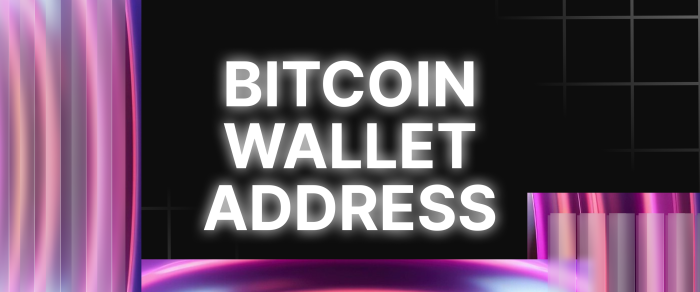The Transformative Impact of Blockchain on The Gaming Industry
Imagine a few years ago, if someone told you that playing online games would actually earn you real money, you’d probably think they were dreaming. Well, thanks to blockchain technology, that dream has become a reality. Blockchain technology is gradually transforming many traditional industries, and gaming is no exception.
In fact, the global market for blockchain-based gaming was worth $4.9 billion last year, and experts predict it could skyrocket to $818.5 billion by 2032. Clearly, the transformative power of blockchain in gaming is heating up and turning heads.
So, let’s discuss: How exactly is blockchain revolutionizing the gaming sector?
Key Takeaways:
- Blockchain technology is being used in gaming to build decentralized and secure ecosystems for gamers, allowing ownership of in-game assets and peer-to-peer transactions.
- Blockchain can help gamers own their in-game assets, create open gaming economies, and earn benefits.
- Axie Infinity, The Sandbox, and Gala Games have received praise for their creative gaming features, which reward players with cryptocurrencies and NFTs.
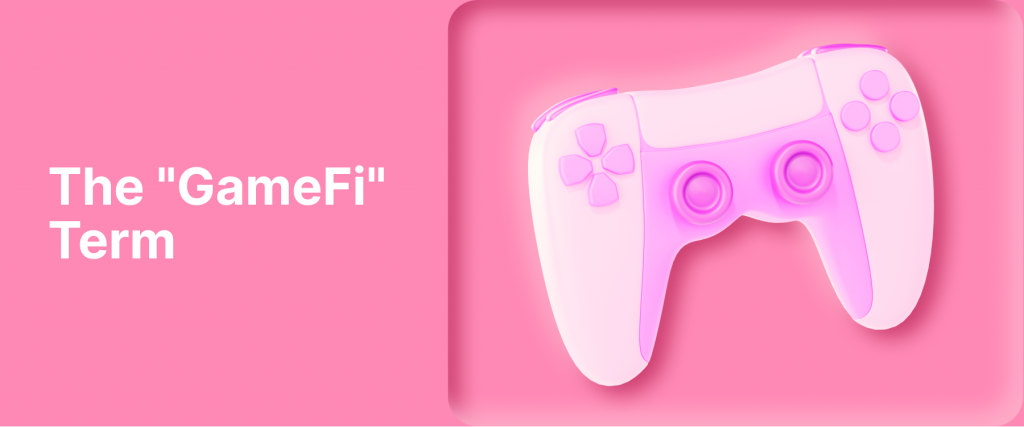
What Does The Term “GameFi” Mean?
The word “GameFi” refers to the novel combination of blockchain technology and gaming, which creates decentralized gaming markets whereby unique financial incentives and possibilities are introduced via play-to-earn blockchain games.
With this new idea, gamers may gain cryptocurrency just by participating in online gaming and doing various tasks in their favorite games.
Instead of focusing solely on monetary investments, as has been the case in the traditional gaming industry, GameFi ushers in a new era by rewarding players for the time and effort they put into playing blockchain games.
P2E token platforms have become a popular investment choice due to the widespread adoption of this revolutionary paradigm among crypto-gaming aficionados. Gaming tokens, or NFTs, are developed in GameFi to represent tradable in-game assets like real estate, characters, items, and cash.
Players can earn these tokens by actively participating in game-related activities, such as completing quests, emerging victorious in battles, or staking tokens. The acquired tokens can be utilized to purchase in-game items, engage in peer-to-peer trading with other players, or exchange for other cryptocurrencies or fiat currencies.
Furthermore, GameFi platforms may offer additional features from DeFi, such as yield farming, staking, and liquidity supply.
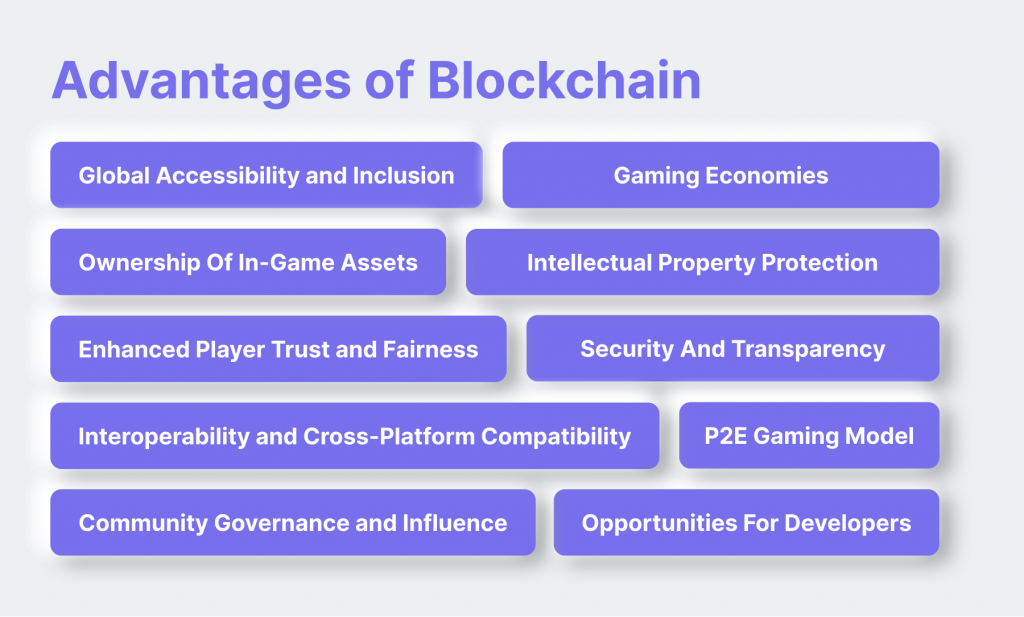
Earning with Blockchain in Game Industry from A to Z
Blockchain technology, which plays a pivotal role in revolutionizing the gaming industry, is characterized by its decentralized and distributed ledger system that ensures secure, transparent, and immutable transactions.
Acting as a digital record, it maintains a series of blocks, each consisting of a cryptographic hash of the previous block, a timestamp, and transaction data. This technology has applications in the gaming sector, providing gamers with a decentralized and secure environment to engage in gameplay, resource trading, and reward acquisition.
In essence, blockchain technology introduces a new paradigm in gaming, offering players greater control over their virtual assets and fostering a vibrant ecosystem within the gaming community.
Here are the major revolutionary benefits that blockchain has brought to the industry.
P2E Gaming Model
Thanks to blockchain technology, new game models have emerged that place less emphasis on programmers and more on players. Peer-to-peer networks powered by decentralized gaming platforms have made gaming more accessible and democratic.
In these models, players have a hand in shaping the game and reaping the financial rewards, making for a more collaborative and satisfying gaming experience for everyone involved.
The play-to-earn idea enables gamers to make money through gaming by achieving goals and obtaining incentives in the form of cryptos. This provides gamers with a fresh opportunity to earn money from their efforts and talents.
Gaming Economies
Decentralization facilitated by blockchain technology has given rise to the creation of decentralized gaming economies. Game developers can now integrate blockchain-based cryptocurrencies into their games, allowing players to earn valuable digital assets.
For example, completing objectives in a game may reward players with Ethereum-based tokens that can be used to purchase gift cards for popular brands or exchanged for other cryptocurrencies.
This introduces the concept of monetizing in-game actions to fuel real-life transactions, opening up a world of new opportunities and digital economies. Players can even engage in peer-to-peer transactions or hire assistance from experienced players, creating a dynamic and vibrant gaming ecosystem.
Ownership Of In-Game Assets
Blockchain technology brings transparency and legitimacy to in-game asset ownership. Through blockchain-based games, players gain true ownership of their in-game assets, which can be rare and valuable.
Smart contracts facilitate secure and irreversible transactions, ensuring players receive their assets directly into their public address accounts.
This decentralized approach eliminates the need for intermediaries and central authorities, safeguarding the ownership rights of players within the game. As a result, players can freely trade their assets, exchange them for other cryptocurrencies or even sell them for real-world cash.
Intellectual Property Protection
Blockchain technology offers a robust solution for protecting intellectual property rights in the gaming industry. Using blockchain’s decentralized and transparent nature, game developers can ensure that their original creations, artwork, and game content are securely stored and verified.
This helps combat plagiarism, unauthorized use, and counterfeit items, providing a secure environment for creators to showcase their work and receive proper recognition.
Enhanced Player Trust and Fairness
Blockchain technology introduces a trustless environment where transparent algorithms and smart contracts determine game outcomes and rewards.
This eliminates concerns of cheating or unfair practices as players can rely on the immutability and integrity of blockchain to ensure a level playing field for all participants. The decentralized nature of blockchain also reduces the reliance on centralized authorities, creating a more trustworthy and fair gaming ecosystem.
Interoperability and Cross-Platform Compatibility
Blockchain-based gaming platforms have the potential to enable interoperability and cross-platform compatibility. With blockchain protocols and standards, players can seamlessly transfer their in-game assets, achievements, and progress across different games and platforms.
This enables a more interconnected gaming experience and promotes collaboration and engagement between players in various gaming communities.
Opportunities For Developers
While blockchain technology empowers players, it also offers opportunities for game developers. Smart contracts enable developers to regulate and control the gaming economy by setting predefined conditions for trading. This ensures fairness in transactions and prevents market oversaturation. Developers can create immersive gaming worlds and establish the foundations for player-driven economies.
They can generate revenue by charging trading fees or implementing taxes on peer-to-peer transactions, mimicking the financial systems of the real world. Blockchain technology gives developers the tools to shape innovative gaming experiences and benefit from the evolving gaming landscape.
Security And Transparency
Blockchain provides a secure and transparent mechanism for tracking and verifying in-game transactions. The immutable nature of blockchain ensures that all transactions are recorded in an unalterable and visible manner, enhancing trust and security for gamers. Additionally, blockchain-based solutions offer a more transparent way to manage player data.
With growing concerns over data breaches and privacy issues, gamers can regain control over their data through blockchain-based data management systems. They have better insights into how their information is used and who has access to it, providing higher transparency and data security.
Community Governance and Influence
Blockchain-based gaming ecosystems often involve community governance, where players have a say in the decision-making processes and development of the game.
Through decentralized voting mechanisms and consensus protocols, players can actively contribute to shaping the game’s future, suggesting new features, proposing changes, and voting on important matters. This level of community involvement fosters a sense of ownership and belonging, strengthening the bond between players and developers.
Global Accessibility and Inclusion
Blockchain-powered gaming platforms have the potential to overcome geographical barriers and enhance accessibility to gaming for individuals around the world.
With decentralized infrastructure and tokenized economies, players from different regions can participate in games and earn rewards, regardless of location or local currency limitations.
This fosters inclusivity and provides opportunities for individuals in underserved regions to engage in gaming and benefit from its economic opportunities.
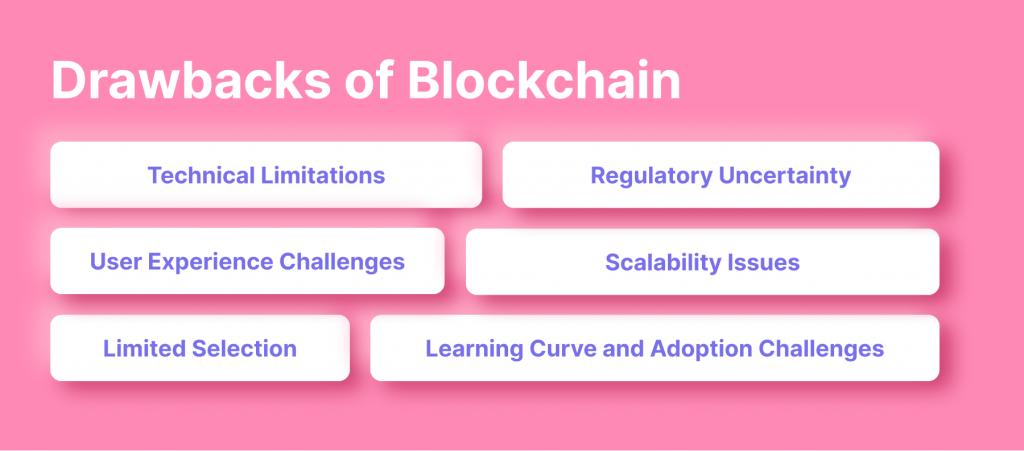
Downsides Of Using Blockchain In Gaming
While blockchain technology brings numerous advantages to the gaming industry, it is important to consider the potential drawbacks associated with its implementation.
Technical Limitations
Integrating blockchain technology into games requires technical expertise, posing a challenge for developers unfamiliar with the technology. This complexity can increase development time and costs, making it harder for smaller developers to enter the market.
Additionally, players may find the technical requirements of using crypto and blockchain technology, such as setting up a crypto wallet and acquiring cryptocurrencies or NFTs, daunting and off-putting.
Regulatory Uncertainty
Blockchain technology’s regulatory landscape is still evolving, creating uncertainty around how blockchain games will be regulated in different jurisdictions.
This ambiguity introduces legal and compliance risks for developers, who must navigate complex regulatory frameworks. The lack of clear guidelines can hinder the growth and development of blockchain gaming platforms.
Limited Selection
As the blockchain gaming sector is still relatively new, there is a limited selection of games available. This lack of variety may not attract experienced players who seek a competitive and diverse gaming environment. Players may be hesitant to fully embrace the ecosystem without a robust offering of blockchain-based games.
Scalability Issues
Scalability remains a significant challenge for blockchain technology. With the potential for high transaction volumes in online gaming, blockchain networks may struggle to handle the required throughput.
This can result in slow transaction times, elevated transaction fees, and a bad user experience. Achieving scalability in blockchain gaming is an ongoing concern that needs to be addressed for widespread adoption.
User Experience Challenges
Blockchain transactions typically require confirmations and verification, which can introduce delays in the gaming experience. Players may encounter longer waiting times for transaction confirmations or face complex procedures for acquiring and trading in-game assets.
These hurdles can impact the overall user experience, particularly for players accustomed to seamless and instantaneous interactions in traditional gaming.
Learning Curve and Adoption Challenges
Adopting blockchain technology in gaming requires players to familiarize themselves with new concepts, such as digital wallets, private keys, and blockchain protocols.
This learning curve can be a barrier to mainstream adoption, as it may deter casual players who prefer straightforward and user-friendly gaming experiences. Increasing awareness, education, and user-friendly interfaces are essential for overcoming these adoption challenges.
Top blockchain-Based Games
As said, crypto games have introduced innovative elements like in-game ownership, NFTs, and blockchain technology, providing players with opportunities to earn rewards. Let’s explore some of the top blockchain-based games in 2023.
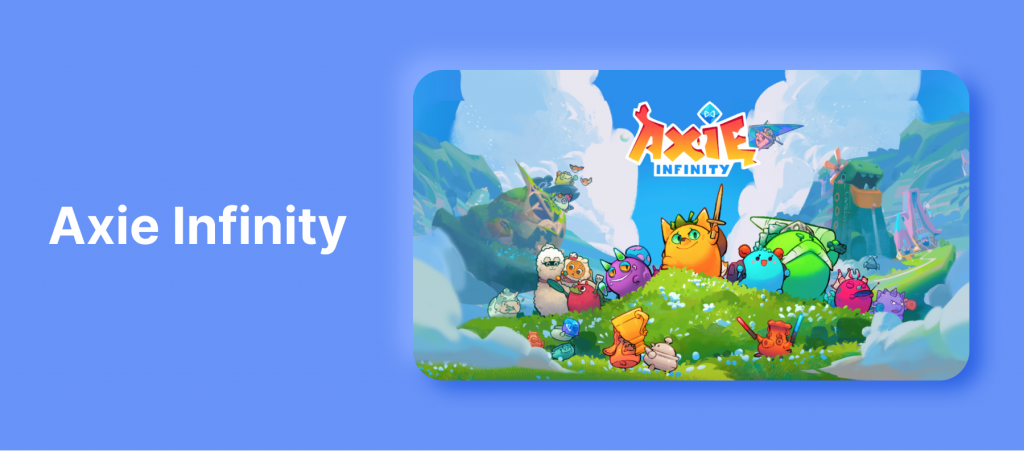
1. Axie Infinity
Axie Infinity has gained significant attention as a popular blockchain game. Players can breed, battle, and trade virtual creatures known as Axies. Each Axie possesses unique characteristics, abilities, and traits, making them valuable NFTs.
The game is a turn-based strategy game, with players earning SLP tokens by succeeding in battles. The native cryptocurrency of Axie Infinity is AXS, an ERC-20 token used for in-game exchanges. AXS holders can also participate in the governance of the ecosystem and earn rewards through token staking.
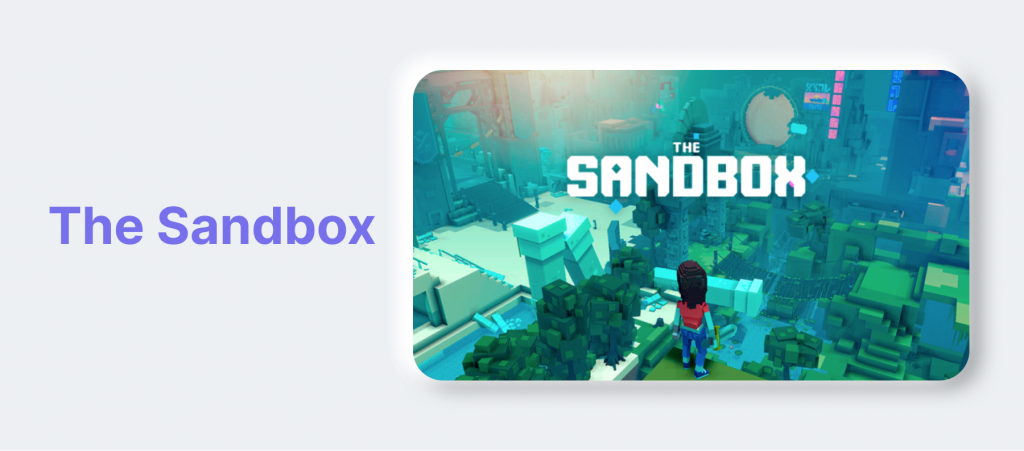
2. The Sandbox
The Sandbox is a decentralized virtual world built on blockchain technology. This metaverse-building game focuses on user-generated content and follows a P2E model. Players can earn crypto rewards by creating, sharing, and monetizing game content. NFTs represent various in-game assets such as characters, buildings, items, and land.
The Sandbox features a marketplace where players can sell their assets. Well-known brands and businesses have acquired land in the Sandbox, contributing to its growing ecosystem. Transactions within the platform utilize SAND tokens.
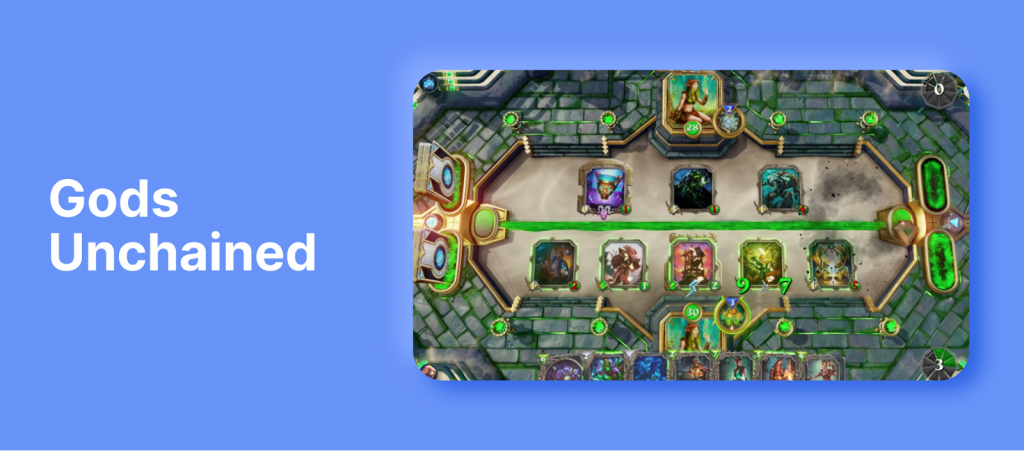
3. Gala Games
Gala Games is a blockchain gaming platform offering a range of P2E games. Powered by Ethereum, Gala Games allows players to earn cryptocurrencies and NFTs through gameplay. The platform operates on a distributed, user-owned node network that enhances security and guide development.
Gala’s native GALA token serves as an in-game currency, incentivizes node operators, acts as a payment medium for items in the Gala Store, and facilitates governance voting.
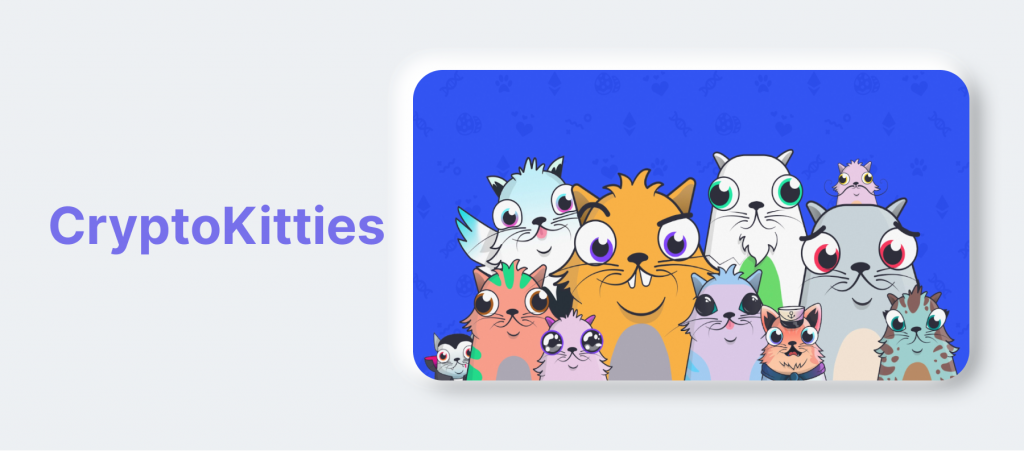
4. CryptoKitties
CryptoKitties is a pioneering blockchain game that popularized the concept of digital collectibles. Players can buy, breed, and trade virtual cats, each representing a unique NFT. Each CryptoKitty has distinct attributes and characteristics, making them highly sought after.
Players can earn rewards by breeding rare or desirable CryptoKitties and selling them on the game’s marketplace. Transactions and ownership of CryptoKitties are recorded on the blockchain, ensuring transparency and scarcity.
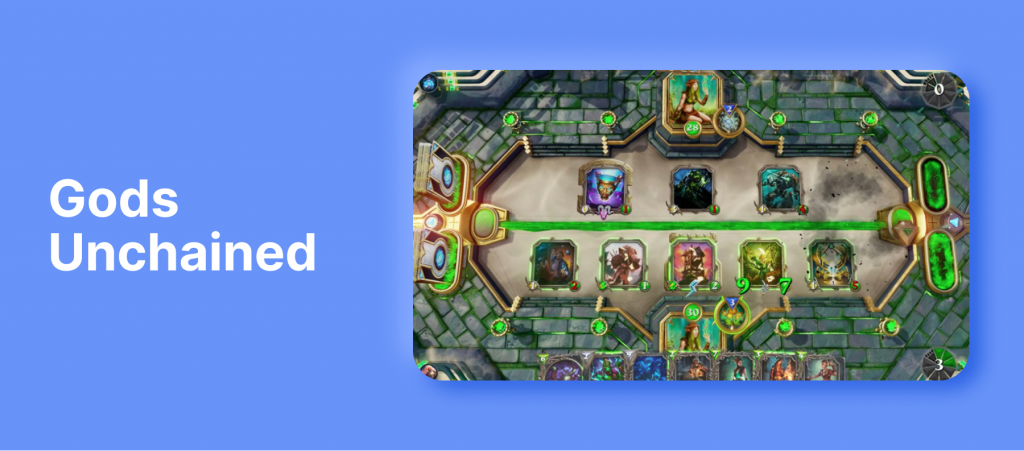
5. Gods Unchained
Gods Unchained is a competitive trading card game built on the Ethereum blockchain. Players can collect and trade digital cards representing powerful mythical creatures and spells. These cards are stored as NFTs, allowing players true ownership and control over their assets.
Through skillful gameplay and strategic decision-making, players can earn rewards and increase the value of their card collection. Gods Unchained has gained recognition for its balanced gameplay mechanics and vibrant community.
The Future Of Blockchain-Based Gaming Is Bright!
When Satoshi Nakamoto first proposed the idea of blockchain in 2008, nobody could have imagined its profound impact on our society so soon. But here we are, pleased with the results of all this research and development.
The relevance of this movement in technology toward more openness and user-friendliness was clearly demonstrated in the gaming industry, as the overall gaming experience now considers gamers, developers, investors, and traders all together.


